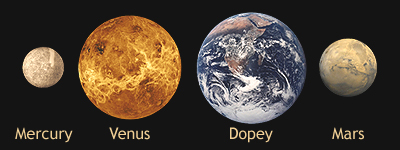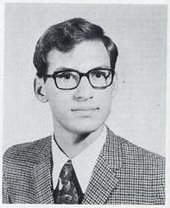
And of course, the Intelligent Design Network's John Calvert, an attorney and managing director in Johnson County, Kansas, reacted to the offering of the course by saying "To equate intelligent design to mythology is really an absurdity, and it's just another example of labeling anybody who proposes (intelligent design) to be simply a religious nut. That's the reason for this little charade."
"Little charade." That reminds me of Kristinn Taylor calling Cindy Sheehan's vigil a "publicity stunt."
Since I've been thinking about intelligent design for about four and a half decades (I'm 49 now and I probably started seriously thinking about God creating the heavens and the earth when I was around 4), you can imagine I've developed a few opinions on the subject. A couple of years ago, while I was writing an episode of my yet-to-be-produced drama series, the topic of the origin of the universe came up, as it usually does whenever I write about characters who are deep thinkers. In this episode, the central character, Zeph, who is from a deeply religious Amish background and is now an agnostic, has a long, laid-back discussion with a new friend, Sadiq, an Iraqi-American who grew up in a mostly secular environment and is now exploring his Muslim heritage. This is an excerpt from the dialogue.

SADIQ Have you kept any of your faith from when you were Amish?
ZEPH Mostly I've been describing myself as an atheist. But to be truly scientific, I need to acknowledge the possibility of the existence of God, and so I should call myself an agnostic.
SADIQ You acknowledge the possibility of the existence of God?
ZEPH It's a long shot, but sure, it's possible. Since we learned from Hume in philosophy 101 that nothing can be conclusively proven, we know that we can't conclusively prove the non-existence of God. Of course every fervent believer takes that as absolute proof that God exists, because his non-existence can't be proven.
(Looks to Sadiq apologetically)
I'm sorry. I didn't mean to—
SADIQ It's okay. I'm not a fervent believer.
ZEPH Have you always believed in Allah, or was that something you had to develop when you returned to Islam?
SADIQ I've always believed there was something, some supernatural entity. Some self-aware, creative energy-accretion. And so it was a simple matter of applying the name Allah to that entity when I started studying Islam. Actually, the book I started with was Islam for Dummies.
ZEPH You didn't. Heh.
Zeph nods in recognition.SADIQ Then I read a few other books. I couldn't accept every statement I read about the nature of Allah. But studying those books...felt good. I felt a profound sense of well-being. A connectedness with past generations.
ZEPH Yeah. I miss that.
Zeph shrugs and frowns and hesitates before responding.SADIQ You can't come to the point where you can accept the idea of just an entity, a guiding presence in the universe? Forget names. Any names we've come up with for the entity are wrong. It has its own name.
Sadiq processes this a moment and then chuckles.ZEPH I acknowledge the possibility of it.
(Shrugs)
It's hard to explain. It's like... Picture somebody blowing smoke rings up into a dark room. Or I guess they would be smoke domes. Smoke balloons. It's a dark room, but there's enough light that we can see these smoke domes slowly expanding and dissipating. Okay, now, at the microscopic level, think of all of the particles of soot that make up that smoke. Incredibly fine, tiny particles of soot. Okay, now think of each tiny particle of soot...as a galaxy.
SADIQ Not just a star, a galaxy of stars in each particle of soot. "Billions and billions."
ZEPH Heh. "Come with me..." Okay, now locate the speck of soot that represents the Milky Way.
SADIQ Yeah, I see your point—an entity who can relate to the universe at that scale, how can it interact with us at our scale?
ZEPH It's totally possible that an entity exists who finds the spread of galaxies no more complex than a city. Or a motherboard. And it's totally possible that an entity exists who can interact with our daily lives.
SADIQ Yeah—but how can those entities be the same, the scales are so vastly different. I see.
ZEPH And it's entirely possible that there are nested entities ranging from the local to the universal. And beyond! But then you're starting to talk about a corporate chart. A population of entities.
SADIQ And if you don't like something about the local entity, can you go to its supervisor?
ZEPH Heh. But then again, after reading about quantum weirdness, I have to admit that my thinking about scale is limited to my three-dimensional experience.
SADIQ Quantum weirdness... Schrödinger's cat. Superposed states.
ZEPH Yeah. Split a beam of electrons, alter one of the beams, and the other beam is altered simultaneously, regardless of the distance between them.
SADIQ Yeah, I remember a lecture on this. It's as if the separated particles are actually the same particle in a different dimension.
ZEPH So, in a six-dimensional universe, this universe might be fairly easy to manage. It's possible.
If a proponent of intelligent design wants to make bold, confident statements about its validity, he or she must be as familiar as possible with the nature of the known universe for those statements to be informed and credible. But when the human brain honestly tries to grasp the incomprehensibility of, say, the number of atoms in the known universe, or the time it takes light to travel from here to the edge of the known universe, confidence usually isn't the result.


